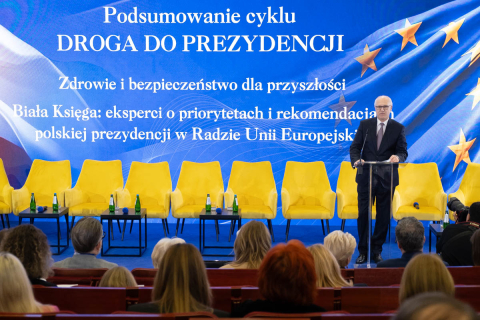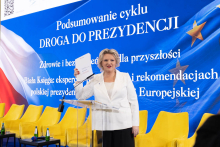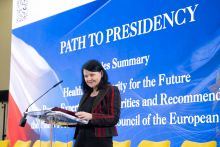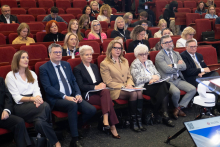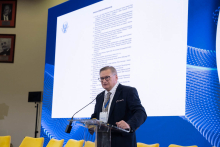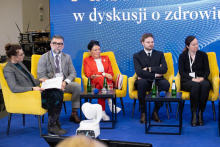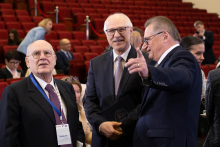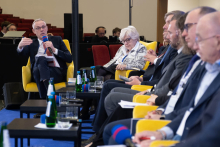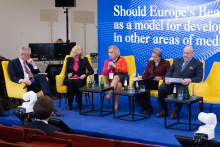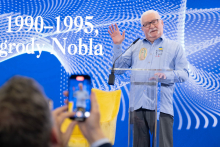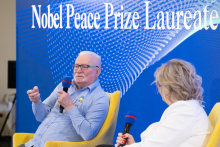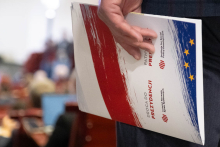The conference was opened by Małgorzata Bogusz, President of the Institute for the Development of Social Affairs, and the honorary address was delivered by Prof. Rafal Krenke, Rector of MUW.
- The presidency of the Union is a privilege, but also a huge responsibility that we take on every 14 years. However, smaller components of this responsibility we carry on our shoulders every day - as doctors, teachers, politicians, scientists, entrepreneurs, social activists. The motto of our 2025 presidency is “Security Europe.” If we break down the concept of security into its various areas, health security is certainly one of the most important - Professor Krenke said.
Honorary speeches were also delivered by Magdalena Sobkowiak-Czarnecka, Undersecretary of State in the Chancellery of the Prime Minister (European Union Affairs Division) and Katarzyna Kacperczyk, Undersecretary of State in the Ministry of Health. Both referred to the White Paper, appreciating the importance of the document and thanking for the enormous amount of work put into it.
White Paper
The document is a collection of comments and opinions on the priorities of the Polish presidency. The 300 pages include statements from 141 people. During the conference, the White Paper was presented by Prof. Bolesław Samoliński, Head of the Department of Public and Environmental Health MUW.
- The White Paper of the Polish Presidency is a unique document. It was created on the basis of debates and two years of work by the Institute for the Development of Social Affairs. We, the Medical University of Warsaw, were also involved in it. The White Paper contains visions, views, opinions and knowledge presented by various stakeholders in the health care system - said Professor Samoliński. - So here we have different points of view, both from clinicians and NGOs, but also from politicians. This clash of different backgrounds, different statements gives a very interesting look at where we are at the moment in health issues in our country and in the EU. The White Paper is not read like a fiction book, it is studied, it requires reflection.
Dr. Adam Jarubas, Chairman of the European Parliament's Committee on Public Health (SANT), also referred to the White Paper.
- The nature of white papers is such that they are usually the foundation for a proposed reform. We have to stipulate that a European health policy is something that arises. So is a European defense policy. We do not have a strong anchor for both these policies in the treaties. They are forced by life, situations such as war, or health crises such as COVID. They led to the formation of the first legislative Public Health Committee in Parliament, which I have the honor to chair. Currently, a lot is happening in the area of health care. The Polish presidency has a very active role here. And a lot of legislation will be adopted during its term. The White Paper is an intellectual contribution that I hope will be used not only by Polish specialists - but also by European ones.
Key challenges
Mental health of children and adolescents, public health in its broadest sense, digitization of health care and drug safety - these are the priorities of our presidency. Topics related to them were discussed for hours by experts.
During the first session, entitled “The Polish Presidency as the opening of a new institutional cycle in the discussion of health in the EU” - considered, among other things, what steps to take so that patients in Europe are treated according to the same standards of treatment. This is already the case in pediatric hematology. The topic of prevention in cardiovascular diseases also came up.
Prevention and health education was devoted to the entire second panel. It was opened by Wojciech Konieczny, Secretary of State at the Ministry of Health, and was attended by Dr. Nino Berdzuli, WHO representative in Poland, as well as Prof. Jean Bousquet, honorary professor of pulmonology at the University of Montpellier in France. They talked about access to tobacco products, prevention in terms of environmental pollution, and effective communication methods in health education.
Another discussion centered around the question of whether EU citizens will be secured in medicines and medical devices. Here, among other things, there was the issue of the so-called pharmaceutical package - unreviewed for 20 years - which conditions access to medicines and therapies.
There was also a panel on women's safety in the context of their sexual and reproductive rights. Meanwhile, the last discussion was about health plans for Europe. Experts discussed whether the European Cancer Plan should inspire analogous plans in particular medical fields.
Special guest Lech Wałęsa spoke at the end of the conference. In his speech he went back to the days of “Solidarity,” and in a conversation with Małgorzata Bogusz he revealed what to do to stay in such good shape for many years.
The event was organized by the Institute for the Development of Social Affairs as well as the Medical University of Warsaw. When asked about MUW's role in the event, Rector Rafal Krenke replied:
- I am very pleased that this conference can be held right here within the walls of the Medical University of Warsaw. We are one of the largest medical universities in Poland and the oldest academic university in our capital. Drawing on our experience, our history and academic tradition, we strive to act for the benefit of future generations. We want to care not only for the “current” health of our patients, but also for their well-being in the years to come and future generations.
In addition to the people mentioned in the text, the conference was attended by: Prof. Maciej Banach, Chairman of the Polish Lipid Society; Bartłomiej Chmielowiec, Ombudsman for Patients' Rights, Prof. Alicja Chybicka, Member of Parliament of the Republic of Poland, Chairman of the Parliamentary Group for Rare Diseases, Prof. Piotr Czauderna, Chairman of the Health Care Council to the President of the Republic of Poland, Dr. Beata Małecka-Libera, Chairwoman of the Senate Health Committee, Dr. Andrzej Ryś, Principal Scientific Adviser, Directorate General for Health and Food Safety of the European Commission (DG SANTE), Dr. Aleksandra Lewandowska, National Consultant in child and adolescent psychiatry, Vice Chairman of the Council for Mental Health at the Ministry of Health, Prof. Iwona Paradowska-Stankiewicz, National Consultant in Epidemiology, Prof. Miłosz Parczewski, National Consultant in Infectious Diseases, Prof. Piotr Rutkowski, Chairman of the Board of the Polish Oncology Society, Chairman of the Health Minister's Team for the National Oncology Strategy, Prof. Piotr H. Skarżyński, Founding Member of the World Hearing Forum at the WHO, WHO Expert, Dr. Grzegorz Cessak, President of the Office for Registration of Medicinal Products, Medical Devices and Biocidal Products, Prof. Violetta Skrzypulec-Plinta, Head of the Department of Women's Health as well as the Department of Reproductive Health and Sexology at the Medical University of Katowice, Dr. Andrzej Depko, National Consultant in Sexology, Dr. Agnieszka Gorgoń-Komor, Senator of the Republic of Poland, Senate Committee on Social Health, Prof. Urszula Demkow, Undersecretary of State, Ministry of Health, Prof. Janina Stępińska, Director of the National Institute of Cardiology, Prof. Brigid Kwiatkowska, National Consultant in Rheumatology.
